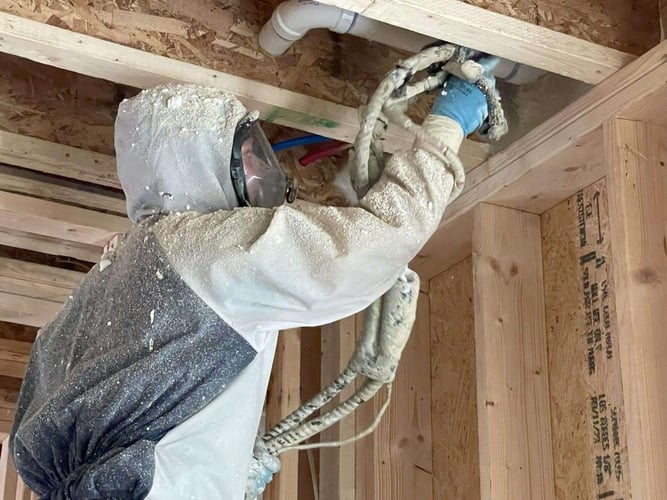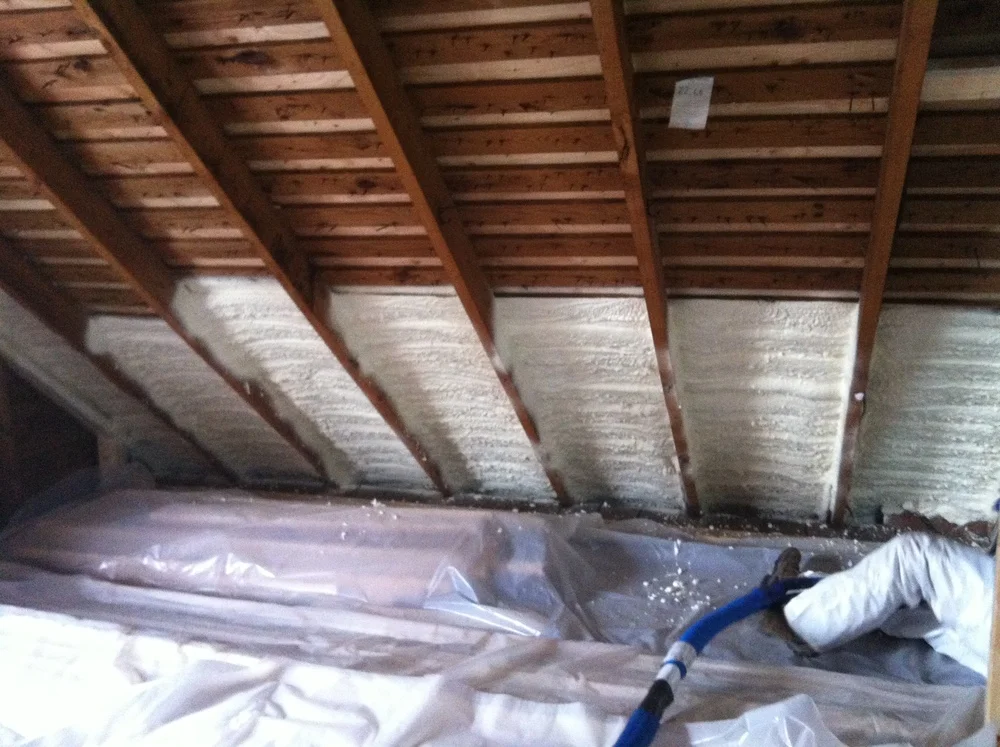How Spray Foam Can Improve Power Effectiveness in Your Home
How Spray Foam Can Improve Power Effectiveness in Your Home
Blog Article
Spray Foam: The Ultimate Service for Air Sealing and Insulation
Spray foam insulation has actually become a leading solution for effective air securing and thermal insulation, providing an one-of-a-kind mix of homes that set it besides traditional methods. Its ability to expand and fill up voids makes it specifically reliable in preventing air leakage, which can substantially influence energy effectiveness. Comprehending the complete extent of its advantages, installation processes, and comparisons with various other insulation kinds is crucial for making informed choices. As we discover these elements, the implications for both new buildings and retrofits become progressively significant. What variables should affect your choice?
What Is Spray Foam?
Spray foam is a versatile insulation material that combines the concepts of air sealing and thermal resistance to improve energy performance in structures. Made up largely of polyurethane or other similar compounds, spray foam is applied as a liquid that expands upon contact with surface areas, producing a solid, constant layer of insulation. This unique residential or commercial property permits it to fill up voids, splits, and voids that conventional insulation products might ignore, offering a superior air seal.
There are 2 main sorts of spray foam: open-cell and closed-cell. Open-cell spray foam is lighter and much more adaptable, using outstanding noise absorption and a reduced R-value per inch - Spray Foam. On the other hand, closed-cell spray foam is denser, offering a higher R-value, dampness resistance, and added architectural integrity to constructing elements
The application process usually includes customized devices, making sure a smooth application that sticks to various substratums, including metal, concrete, and wood. This versatility makes spray foam ideal for both new constructions and retrofitting existing structures. Its capability to create an impermeable barrier dramatically adds to decreasing energy consumption and improving indoor air quality, therefore making it a recommended option amongst house owners and home builders alike.
Advantages of Spray Foam Insulation
One of one of the most considerable benefits of spray foam insulation is its exceptional ability to create a constant air barrier, which properly decreases energy loss. Unlike standard insulation materials, spray foam broadens to fill up cracks and spaces, ensuring that air leak is drastically decreased. This characteristic not just boosts power effectiveness however likewise causes decrease energy expenses over time.
Additionally, spray foam insulation gives exceptional thermal resistance, contributing to an extra secure indoor atmosphere. Its high R-value per inch permits for effective insulation in restricted spaces, making it suitable for attic rooms, wall surfaces, and crawl areas. Moreover, the moisture-resistant homes of spray foam help protect against mold and mildew and mildew growth, advertising much healthier living problems.
Another crucial benefit of spray foam insulation is its sound-dampening high qualities (Spray Foam). It successfully decreases sound transmission in between rooms, producing a quieter and a lot more comfortable home environment. The longevity of spray foam additionally stands out, as it does not sag or work out in time, keeping its performance throughout its life expectancy
How Spray Foam Works
Understanding exactly how spray foam insulation functions is essential for appreciating its performance in air sealing and thermal resistance. Spray foam insulation includes two key components: isocyanate and polyol material. When these components are blended, they undertake a chemical response that creates the product to expand swiftly, producing a dense foam that loads fractures, dental caries, find here and spaces.
As the foam expands, it sticks to surface areas, creating an impermeable seal that significantly minimizes air seepage. This particular makes spray foam insulation highly effective at preventing drafts and wetness infiltration, which can lead to energy loss and damage over time. Additionally, the closed-cell version of spray foam uses premium thermal resistance as a result of its inflexible framework, properly minimizing warmth transfer.
The special buildings of spray foam allow it to comply with irregular surface areas, ensuring comprehensive protection and a smooth obstacle. As a result, spray foam insulation not only improves power performance yet also adds to enhanced indoor air high quality by decreasing the buildup of allergens and contaminants. Inevitably, understanding the technicians behind spray foam highlights its duty as a superior option for insulation and air sealing in both business and household applications.
Installment Process Introduction

Prior to setup, the space should be appropriately cleaned and prepped, ensuring that surfaces are free from dirt, particles, and dampness. Since contaminants can compromise adhesion and total performance, this action is important. As soon as the area is prepared, the application involves blending the 2 elements of the spray foam, which broadens upon contact and fills up voids effectively.
Trained professionals must carry out the installation, making use of specific devices to make certain uniform insurance coverage and ideal density. Security precautions, consisting of wearing protective gear and making sure correct ventilation, are crucial throughout this process. After application, the foam typically treatments quickly, creating a solid obstacle that improves energy efficiency.
Comparing Spray Foam to Typical Insulation
When assessing insulation options, spray foam insulation stands out in comparison to typical materials such Get More Information as fiberglass and cellulose. Unlike fiberglass and cellulose, which can enable air infiltration, spray foam increases upon application, filling up crevices and gaps to produce a closed seal.
Additionally, spray foam provides a higher R-value per inch than conventional insulation kinds, providing even more effective thermal resistance in a thinner profile. This characteristic is particularly valuable precede with restricted dental caries depth. Moreover, spray foam is resistant to moisture and mold and mildew growth, which can be a substantial concern with cellulose and fiberglass, specifically in humid atmospheres.
However, spray foam insulation generally brings a higher in advance expense than its traditional equivalents. Homeowners should weigh this initial investment against lasting energy financial savings and efficiency benefits. Inevitably, while both insulation kinds serve their purpose, spray foam becomes an extra sophisticated service for modern-day insulation needs, specifically in terms of air sealing and thermal performance.

Conclusion
In summary, spray foam insulation represents an extremely reliable solution for attaining optimal air securing and thermal resistance. Its unique residential or commercial properties, consisting of dampness resistance and noise dampening, make it ideal for various applications in both brand-new constructions and retrofitting tasks (Spray Foam). The first prices might be greater contrasted to conventional insulation products, the lasting advantages, such as substantial power financial savings and enhanced indoor air high quality, warrant the financial investment and highlight its worth in contemporary building methods.
Spray foam insulation has actually emerged as a leading service for effective air securing and thermal insulation, using a special mix of residential properties that establish it apart from traditional techniques.Spray foam is a flexible insulation product that combines the principles of air securing and thermal resistance to enhance power performance in buildings.When evaluating insulation options, spray foam insulation stands out in contrast to typical products such as fiberglass and cellulose. Ultimately, while both insulation types offer their function, spray foam emerges as an extra advanced remedy for contemporary insulation needs, particularly in terms of air sealing and thermal effectiveness.
In summary, spray foam insulation represents go right here a very effective solution for attaining ideal air securing and thermal resistance.
Report this page